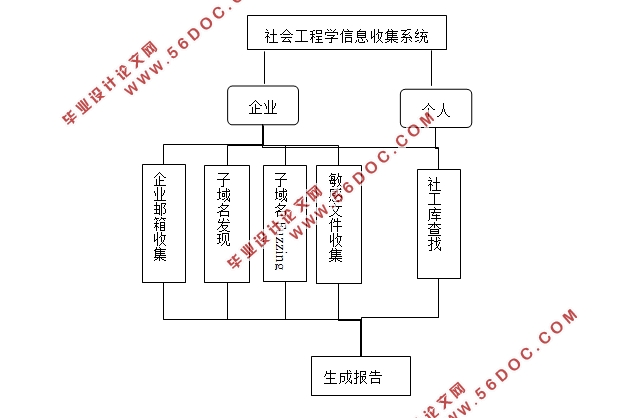基于python的社会工程学信息收集系统设计
来源:wenku7.com 资料编号:WK716366 资料等级:★★★★★ %E8%B5%84%E6%96%99%E7%BC%96%E5%8F%B7%EF%BC%9AWK716366
以下是资料介绍,如需要完整的请充值下载。
1.无需注册登录,支付后按照提示操作即可获取该资料.
2.资料以网页介绍的为准,下载后不会有水印.资料仅供学习参考之用. 密 保 惠 帮助
资料介绍
基于python的社会工程学信息收集系统设计(论文10000字,参考代码)
摘要:社会工程学信息收集系统(Social Engineering Information Gathering System 简称SEIGS)是方便为网络安全人员、网站管理员以及渗透测试人员包括社会工程师在内的提供针对于个人以及企业的信息收集整合的系统。本文通过对互联网上各种信息收集方式的归纳总结,整合、优化、改进出了一套全新的系统。提供了信息收集的实际解决方案。跟传统的社会工程学以及狭义工程学相比,对暴露在公网的信息进行收集整合,更加方便快捷,为安全测试人员、社会工程师以及企业网站管理员节省大量时间,定位到存在问题和漏洞的地方,及时修补从而提高个人信息乃至企业网络安全性。
关键词:Python;社会工程学 ;信息收集系统
Social Engineering Information Gathering System
Based on Python
Abstract:Social Engineering Information Gathering System is designed for Penetration testers
and the website administrators to provide information of Individuals and businesses .In this paper ,the system conclusions kinds of ways to gathering information on the Internet and it is designed to be a new system.And it provides solutions for gathering information.Compared with the traditional social engineering,the system takes less time to find somewhere exists vulnerability to save much time for the manager of the Corporate websites and Social engineers to improve the security of the company.
Key words:Python;Social Engineering;Information Gathering System

目录
1 绪论 7
1.1项目的研究背景和意义 7
1.2项目的国内外研究现状 7
1.3项目的主要研究内容 7
2 Theharvester简介 8
2.1Theharvester概述 8
2.2Theharvester功能 8
3 Python集成环境及相关技术介绍 8
3.1 Python介绍 8
3.1.1核心库简介 8
3.2 wxPython 简介 8
3.3 Python特点 9
3.4 Python应用 10
3.5 Py2exe 简介 10
4 软件需求分析 10
4.1 可行性分析 11
4.2 基本功能模块分析 11
4.3系统GUI界面需求分析 11
4.4 软件性能需求分析 11
4.5 软件开发环境需求 12
5 总体结构设计 12
6 系统基本功能设计与实现 13
6.1 关于通信接口的解决方案 13
6.1.1 解决方案 13
6.1.2 方案实施 13
6.2 邮箱以及子域名收集原理与方法 14
6.2.1 解决方案 17
6.2.2 方案实施 17
6.3 子域名Fuzzing原理与研究 18
6.3.1 解决方案 19
6.3.2 方案实施 19
6.4 异常处理介绍 19
6.4.1 方法及实施 20
6.5 输入检查 20
6.5.1方法及实施 20
6.6 敏感文件收集原理与研究 20
6.7 社工库查找功能实现 21
6.8 生成报告 23
6.9 超时设置 23
6.10 GUI编程 23
6.10.1 主程序界面设计与实现 24
6.10.2 子窗口程序设计与实现 24
6.11 功能测试 25
6.11.1 用户界面 25
6.11.2 功能模块 26
6.11.3 兼容性 28
7 总结与展望 29
7.1 论文总结 29
7.2 问题和展望 29
参考文献 29
致谢 32
|



